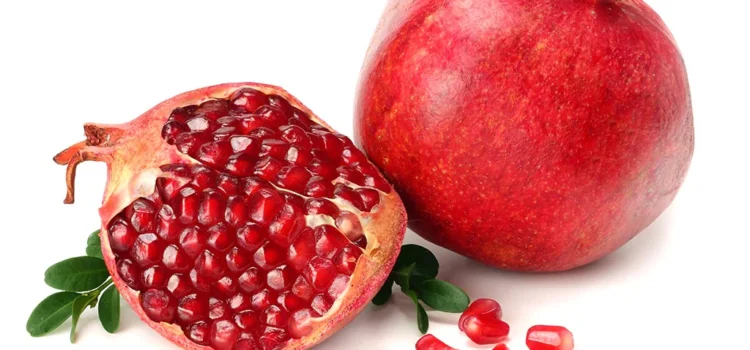Health Benefits of Pomegranate
Pomegranate, scientifically known as Punica granatum, is a fruit-bearing shrub or small tree native to the Mediterranean region. It is widely cultivated for its juicy, ruby-red fruits called pomegranates. Pomegranates have a unique appearance, with a thick, leathery outer skin that ranges in color from yellowish to deep red. Inside the pomegranate, the fruit is divided into compartments called arils, which are small, juicy seed sacs surrounded by a translucent flesh. Each aril contains a seed, and the seeds are edible. The flavor of pomegranate arils is sweet, tangy, and slightly tart.
Pomegranates have been highly valued for their culinary, medicinal, and symbolic significance for centuries. They are often consumed fresh, either by eating the arils on their own or adding them to various dishes, salads, desserts, and beverages. Pomegranate juice is also popular and widely available. Apart from their delicious taste, pomegranates are known for their nutritional and health benefits. They are a good source of vitamins, minerals, and antioxidants. Pomegranates are particularly rich in vitamin C, vitamin K, and several B vitamins, including folate. They also provide potassium, calcium, and dietary fiber.
Pomegranates are known for their high antioxidant content, especially punicalagins, which are unique compounds found in the fruit. Antioxidants help protect the body against free radicals, which can cause cellular damage and contribute to various diseases. Research suggests that consuming pomegranates or pomegranate products may have potential health benefits, such as reducing inflammation, improving heart health, supporting digestion, and even potentially preventing certain types of cancer. However, more studies are needed to fully understand the extent of these benefits.
Overall, pomegranates are a nutritious and delicious fruit that can be enjoyed on their own or incorporated into a variety of recipes, providing both flavor and potential health benefits.
Here are some key health benefits of pomegranates:
1. Rich in antioxidants:
Pomegranates are packed with powerful antioxidants, including punicalagins and anthocyanins. These antioxidants help protect the body against free radicals, which can cause oxidative stress and damage to cells. The high antioxidant content of pomegranates is associated with various health benefits, including reduced inflammation and a lower risk of chronic diseases.
2. Heart health:
Pomegranates have been shown to support heart health in several ways. The antioxidants in pomegranates help reduce oxidative stress and inflammation, which are risk factors for heart disease. Studies have suggested that drinking pomegranate juice may improve cardiovascular health by reducing blood pressure, improving cholesterol levels, and enhancing overall heart function.
3. Anti-cancer properties:
Pomegranates contain compounds with potent anti-cancer properties. Studies have indicated that pomegranate extract and juice may inhibit the growth of cancer cells, particularly in breast and prostate cancers. The antioxidants in pomegranates also help protect against DNA damage, which can lead to the development of cancer.
4. Boosts immune function:
Pomegranates are a rich source of vitamin C, which is essential for a healthy immune system. Vitamin C stimulates the production of white blood cells, enhances their function, and supports the body’s ability to fight off infections and illnesses.
5. Digestive health:
Pomegranates are a good source of dietary fiber, which promotes healthy digestion. Fiber helps regulate bowel movements, prevents constipation, and supports a healthy gut microbiome. Pomegranates also contain natural enzymes that aid in digestion and may alleviate symptoms of digestive disorders.
6. Anti-inflammatory effects:
Chronic inflammation is associated with various health conditions, including heart disease, arthritis, and certain types of cancer. Pomegranates possess potent anti-inflammatory properties, which can help reduce inflammation in the body and mitigate the risk of chronic diseases.
7. Skin health:
The antioxidants in pomegranates are beneficial for maintaining healthy skin. They help protect the skin against damage from environmental factors and reduce signs of aging, such as wrinkles and fine lines. Pomegranate extract is also used in skin care products for its potential to promote collagen production and improve skin texture.
8. Cognitive function:
Some studies suggest that pomegranates may have positive effects on cognitive function and memory. The antioxidants in pomegranates help combat oxidative stress and inflammation in the brain, which may contribute to improved brain health and a reduced risk of neurodegenerative diseases like Alzheimer’s.
Nutrition Value of Pomegranates
The following is the approximate nutritional value of 1 cup (174 grams) of arils (the edible seeds) from a pomegranate:
- Calories: 144
- Carbohydrates: 38 grams
- Fiber: 7 grams
- Sugars: 24 grams
- Fat: 2 grams
- Protein: 3 grams
- Vitamin C: 28.8 milligrams (48% of the daily recommended intake)
- Vitamin K: 46.2 micrograms (58% of the daily recommended intake)
- Folate: 66 micrograms (17% of the daily recommended intake)







